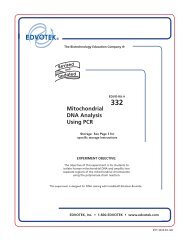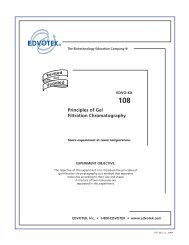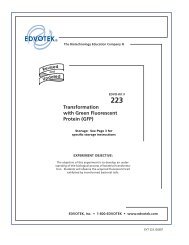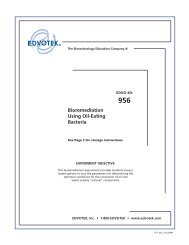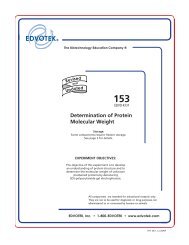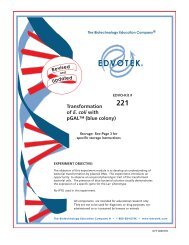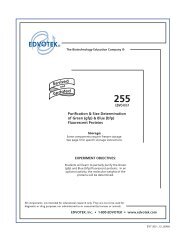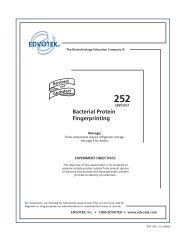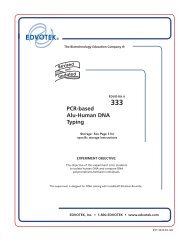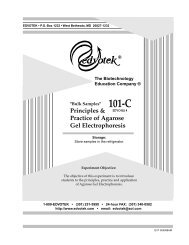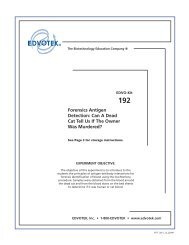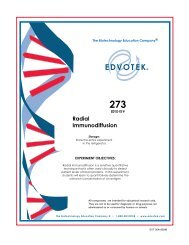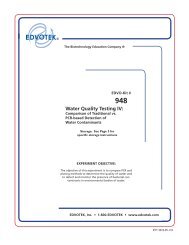953 - EDVOTEK
953 - EDVOTEK
953 - EDVOTEK
Create successful ePaper yourself
Turn your PDF publications into a flip-book with our unique Google optimized e-Paper software.
18<br />
EDVO-Kit #<br />
<strong>953</strong><br />
Water Quality Testing III: Multiplex PCR Analysis for Water Contaminants<br />
Notes to the Instructor:<br />
PCR EXPERIMENTAL SUCCESS GUIDELINES<br />
Please refer to the Appendices section for a summary of important hints and<br />
reminders which will help maximize successful implementation of this experiment.<br />
This experiment has three modules:<br />
The Experiment<br />
I. Isolation of DNA<br />
II. PCR Amplification of Multiplex Water Contaminants<br />
III. Separation of PCR Reactions by Electrophoresis<br />
Micropipetting Basics and Practice Gel Loading<br />
Accurate pipeting is critical for maximizing successful experiment results.<br />
<strong>EDVOTEK</strong> Series 300 experiments are designed for students who have had<br />
previous experience with agarose gel electrophoresis and micropipeting<br />
techniques. If your students are unfamiliar with using micropipets, <strong>EDVOTEK</strong><br />
highly recommends that students perform Experiment # S-44, Micropipetting<br />
Basics, or other Series 100 or 200 electrophoresis experiment prior to conducting<br />
this advanced level experiment.<br />
APPROXIMATE TIME REQUIREMENTS<br />
1. The PCR steps will take about 60-90 minutes or can be processed overnight<br />
and held at 4° C.<br />
2. The experiment can be temporarily stopped after the completion of<br />
Modules I and II and later resumed. Experimental results will not be<br />
compromised if instructions are followed as noted under the heading<br />
“Optional Stopping Point” at the end of Module I and Module II.<br />
3. Whether you choose to prepare the gel(s) in advance or have the students<br />
prepare their own, allow approximately 30-40 minutes for this<br />
procedure. Generally, 20 minutes of this time is required for gel solidification.<br />
See section “Options for Preparing Agarose Gels” below.<br />
Table C<br />
Volts<br />
125<br />
70<br />
50<br />
Time and Voltage<br />
(1.0% - 7 x 14 cm gel)<br />
Recommended Time<br />
Minimum<br />
Maximum<br />
55 min<br />
2 hrs 15 min<br />
3 hrs 25 min<br />
1 hr 15 min<br />
3 hrs<br />
5 hrs<br />
4. The approximate time for electrophoresis will<br />
vary from 1 - 5 hours. Generally, the higher the<br />
voltage applied, the faster the samples migrate.<br />
However, depending upon the apparatus configuration<br />
and the distance between the two<br />
electrodes, individual electrophoresis units will<br />
separate DNA at different rates. Follow manufacturer's<br />
recommendations. Time and Voltage<br />
recommendations for <strong>EDVOTEK</strong> equipment are<br />
outlined in Table C.<br />
Duplication of this document, in conjunction with use of accompanying reagents, is permitted for classroom/laboratory<br />
use only. This document, or any part, may not be reproduced or distributed for any other purpose without the<br />
written consent of <strong>EDVOTEK</strong>, Inc. Copyright © 2006, 2008, 2009 <strong>EDVOTEK</strong>, Inc., all rights reserved<br />
EVT 090205K<br />
The Biotechnology Education Company® • 1-800-<strong>EDVOTEK</strong> • www.edvotek.com



